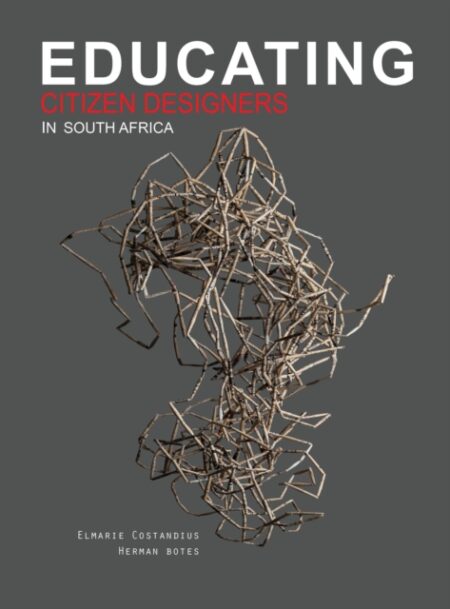-

#DiscourseCafé / #Diskoerskafee
0R250,00Essays by students and former students attached to the FVZS Institute for Student Leadership Development at Stellenbosch University.
Print: View Print Version
-
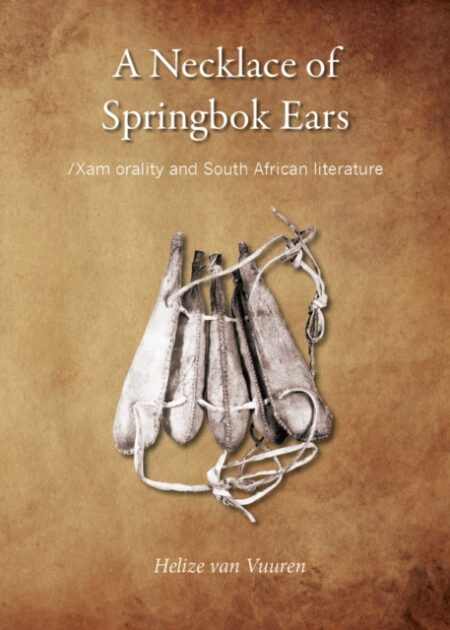
A Necklace of Springbok Ears
0R0,00Where once there were twenty-nine San Bushman languages and/or dialects in Southern Africa, few now remain. The loss of these languages results in the loss of their stored oral culture and indigenous knowledge. All that remains are archaeological evidence and rock art, or slim archives recorded by individuals, such as Wilhelm Bleek, Lucy Lloyd and GR von Wielligh, who heard the encroaching language and cultural death knell before it was too late. The contents of this study hang together as in a “e;necklace of springbok ears”e;. The last dancing rattle and necklace has long since crumbled to dust. Yet the binding string serves as a useful metaphor for the literary texts discussed here and their relation to the culture of the First People. The cosmology embedded in the /Xam myths as recorded by Von Wielligh between the Cederberg and the Gariep (or Orange) River seems to share much with contemporary consciousness: in order to survive, humankind needs to recognise the interdependence of all life.
Print: View Print Version
-
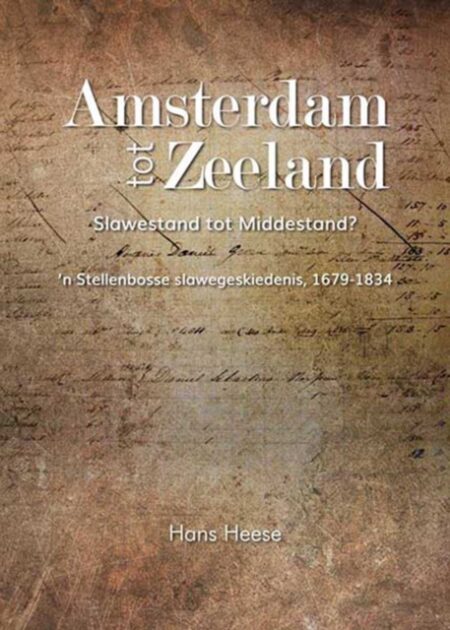
Amsterdam tot Zeeland
0R275,00Sedert die stigting van Stellenbosch en sy distrik in 1679, het slawerny ‘n integrale rol in die ekonomiese en sosiale ontwikkeling van die gemeenskap gespeel. Op 1 Desember 1834 is hierdie stelsel, soos in die res van die Britse koloniale ryk, afgeskaf. Die afskaffing van slawerny het egter geen onmiddellike gelykstelling met die middelklas beteken nie ? die gewese slawe moes tot 1 Desember 1838 steeds as ?ingeboekte vakleerlinge? (apprentices) in die diens van hul voormalige eienaars bly. Gedurende dia vier jaar het daar min opleiding plaasgevind wat hulle werklik vir arbeid in die ope mark sou bekwaam. Ook nE Desember 1838 het die Britse owerheid sy plig versaak om op daadwerklike wyse by te dra tot die opheffing en verbetering van die nagenoeg 36 000 individue se lewensomstandighede. Hierdie taak is deur verskillende sendinggenootskappe met beperkte finansiale bronne, verrig. Enkele slawe het wel die voorreg gehad om in daardie tyd skoolopleiding te ontvang. Dit was egter nie onderwys en geletterdheid wat aanvanklik tot ekonomiese vooruitgang gelei het nie, maar eerder die beoefening van ambagte soos messelary, smidswerk en wamakery.
In Amsterdam tot Zeeland word die unieke genealogiese afkoms van die Stellenbosse slawe en die oorsprong van die bruin gemeenskap bestudeer. Die menings hierin opgeneem word gerugsteun deur die verwerking van oorspronklike dokumente uit die Kaapse Argief wat op die ingeslote kompakskyf gelees kan word.
eBook: View eBook Version
-
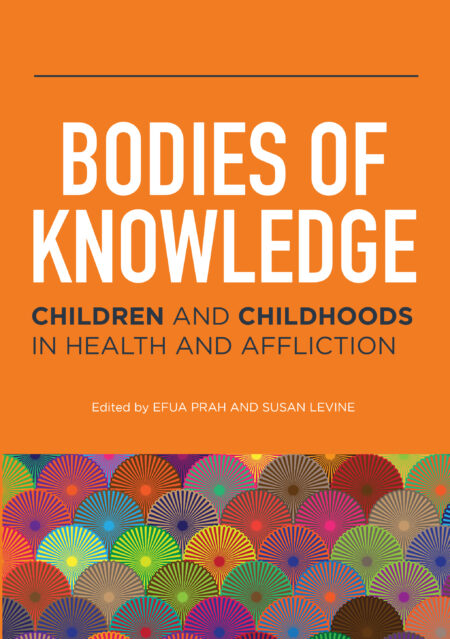
Bodies of Knowledge
0R320,00Spanning the countries of South Africa, Swaziland, and Ghana, this collection of work brings into focus child and youth experience together as a collage of anthropology, creative writing, poetry, and the fine arts. Woven together by questions related to the political economy of child and youth well-being, identity formation, and the multiple layers through which children articulate their health-narrative, O Bodies of KnowledgeO considers living in and coping with chronic illness, spirit-possession, and death. The growth in Critical Health Humanities and the Arts globally, suggests the desire for blended efforts to draw in a wider breadth of knowledge that cuts across the divided worlds of critical social science and the arts. This book, set in an African context, offers myriad possibilities for cross-disciplinary synergies as learning sites. It is a critical contribution to the field of children and childhood studies.
eBook: View eBook Version
-

Bodies of Knowledge
0R255,00Spanning the countries of South Africa, Swaziland, and Ghana, this collection of work brings into focus child and youth experience together as a collage of anthropology, creative writing, poetry, and the fine arts. Woven together by questions related to the political economy of child and youth well-being, identity formation, and the multiple layers through which children articulate their health-narrative, ‘ Bodies of Knowledge’ considers living in and coping with chronic illness, spirit-possession, and death. The growth in Critical Health Humanities and the Arts globally, suggests the desire for blended efforts to draw in a wider breadth of knowledge that cuts across the divided worlds of critical social science and the arts. This book, set in an African context, offers myriad possibilities for cross-disciplinary synergies as learning sites. It is a critical contribution to the field of children and childhood studies.
Print: View Print Version
-

Bookshelf Tutorial
0R0,00Lorem Ipsum is simply dummy text of the printing and typesetting industry. Lorem Ipsum has been the industry’s standard dummy text ever since the 1500s, when an unknown printer took a galley of type and scrambled it to make a type specimen book. It has survived not only five centuries, but also the leap into electronic typesetting, remaining essentially unchanged. It was popularized in the 1960s with the release of Letraset sheets containing Lorem Ipsum passages, and more recently with desktop publishing software like Aldus PageMaker, including versions of Lorem Ipsum.
Lorem Ipsum is simply dummy text of the printing and typesetting industry. Lorem Ipsum has been the industry’s standard dummy text ever since the 1500s, when an unknown printer took a galley of type and scrambled it to make a type specimen book. It has survived not only five centuries, but also the leap into electronic typesetting, remaining essentially unchanged. It was popularized in the 1960s with the release of Letraset sheets containing Lorem Ipsum passages, and more recently with desktop publishing software like Aldus PageMaker, including versions of Lorem Ipsum.
-

Childhood Vulnerabilities in South Africa
0R375,00This book addresses different challenges that endanger the lives of children in South Africa from an ethical perspective. The text is meant to position itself as a resource for specialists (and practitioners) in ethics and childhood studies. The content is systematically and intersectionally presented, based on scholarly analyses, insights, reasoning, and expertise originating in different disciplines and backgrounds. It endeavours to help especially those who study the sociocultural contexts of children and families in terms of challenges and opportunities, and for possible support.
eBook: View eBook Version
-

Christianity and Earthkeeping
0R240,00Why should Christians engage in earthkeeping as Christians and from within Christian communities? What is the underlying theological rationale for that?
In this book some 19 reasons why Christians may be encouraged to engage in earthkeeping are identified, juxtaposed and assessed in order to call for clarity, to invite discussion and to elicit creative tensions. No single position is advocated ? it would be helpful if Christians could engage in earthkeeping on the basis of any of these motivations.
-
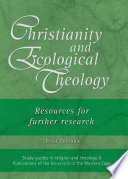
Christianity and Ecological Theology
0R440,00There has been a proliferation of publications in the field of Christian ecological theology over the last three decades or so. These include a number of recent edited volumes, each covering a range of topics and consolidating many of the emerging insights in ecological theology. The call for Christian churches to respond to the environmental crisis has been reiterated numerous times in this vast corpus of literature, also in South Africa.
-
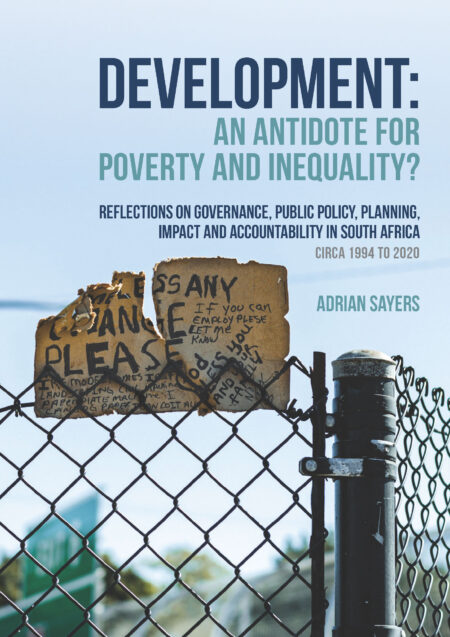
Development: An Antidote For Poverty And Inequality?
0R280,00For more than a century, development discourse and practices have been central to initiatives to change and improve the human condition in response to poverty, deprivation, oppression and inequality. It has informed public policies and shaped the public institutions charged with its implementation and its relations with various forms of associational life. Development: An Antidote for Poverty and Inequality? Reflections on Governance, Planning, Impact and Accountability in South Africa circa 1994 to 2020, is an attempt to examine the extent to which this has occurred in South Africa, an environment that has been impregnated by burgeoning corruption since 1994, the 2008 global economic crises and most recently the COVID-19 pandemic. The pursuit of public policies such as the Reconstruction and Development Programme (RDP), the National Development Plan (NDP) as well as other related sectoral policies and legislation all envisaged the development of institutional capacity to facilitate planning and implementation. This institutional capacity and resource mobilisation would be enhanced by the formation of partnerships with the private sectorcivil society. However, challenges remain in ascertaining progress through the measurement of performance and the evaluation of impacts nationally and in selected regions and local areas. This book documents and outlines these challenges.
-
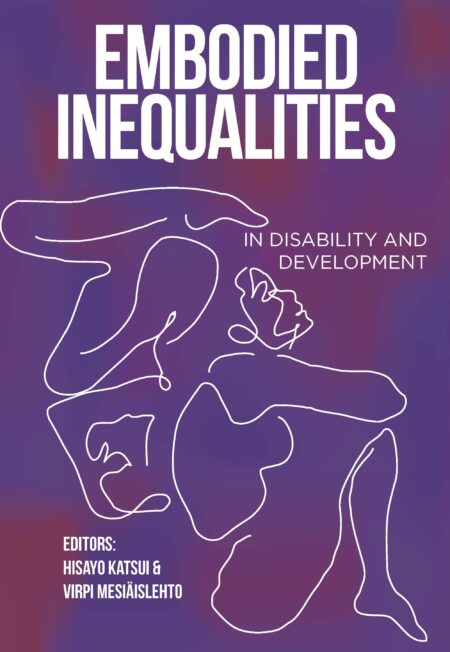
Embodied Inequalities in Disability and Development
0R200,00This book highlights the embodied knowledge of persons with disabilities as a vital resource for understanding equality without taking disability and development for granted. The perspective of embodied inequality offers alternative ways to comprehend our OnormalityO as until now the notion of normality has too frequently excluded persons with disabilities and their perspectives. Disability inclusion has never been as important as it is today in the development discourse, yet systematic discrimination against people due to their disabilities persists. To address this, the link between theories and practices is strengthened in this book. Through using different contexts in the different book chapters, the readers are informed of how profoundly inequalities are embedded in our society and pronounced as embodied experiences of persons with disabilities. The chapters are written not only by academics but also by disability activists and NGO representatives. The chapters focus on disabilities and development as embodied inequalities manifested at different levels, including theory, law, and policy and practice.
In conclusion, the book presents 6 AOs as lessons learned from decolonial understanding and conceptions of embodied inequalities in different contexts of disability and development: Availability, Affordability, Accessibility, Accountability, Assistance, and Affection.
-

Embodied Inequalities in Disability and Development
0R0,00This book highlights the embodied knowledge of persons with disabilities as a vital resource for understanding equality without taking disability and development for granted. The perspective of embodied inequality offers alternative ways to comprehend our OnormalityO as until now the notion of normality has too frequently excluded persons with disabilities and their perspectives. Disability inclusion has never been as important as it is today in the development discourse, yet systematic discrimination against people due to their disabilities persists. To address this, the link between theories and practices is strengthened in this book. Through using different contexts in the different book chapters, the readers are informed of how profoundly inequalities are embedded in our society and pronounced as embodied experiences of persons with disabilities. The chapters are written not only by academics but also by disability activists and NGO representatives. The chapters focus on disabilities and development as embodied inequalities manifested at different levels, including theory, law, and policy and practice. In conclusion, the book presents 6 AOs as lessons learned from decolonial understanding and conceptions of embodied inequalities in different contexts of disability and development: Availability, Affordability, Accessibility, Accountability, Assistance, and Affection.
- Architecture
- Art
- Bibles
- Biography & Autobiography
- Body, Mind & Spirit
- Business & Economics
- Computers
- Cooking
- Drama
- Education
- Family & Relationships
- Fiction
- Health & Fitness
- History
- House & Home
- Juvenile Nonfiction
- Language Arts & Disciplines
- Language Study
- Law
- Literary Collections
- Literary Criticism
- Literature
- Mathematics
- Medical
- Music
- Nature
- Performing Arts
- Philosophy
- Poetry
- Political Science
- Psychology
- Reference
- Religion/Theology
- Science
- Self-Help
- Social Science
- Sports & Recreation
- Study Aids
- Technology & Engineering
- Travel
- True Crime
